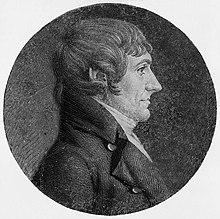William Plumer
William Plumer (born June 25, 1759 in Newburyport , Province of Massachusetts Bay , † December 22, 1850 in Epping , New Hampshire ) was an American politician . From 1802 to 1807 he represented his state in the US Senate , from 1812 to 1813 and from 1816 to 1819 he was Governor of New Hampshire.
Early years and political advancement
William Plumer attended local schools in his homeland. In 1768 he moved with his parents to Epping, New Hampshire, where William continued his school days. After studying law, he was admitted to the bar in 1787. He then began to practice this profession in Epping. In 1783 he was on the Epping parish council. At that time he was a member of the Federalist Party . Between 1785 and 1800 he was a member of the New Hampshire House of Representatives . He was President of the House in 1791 and 1797. Between 1791 and 1792 he was also a member of the New Hampshire Constitutional Revision Committee.
US Senator and Governor
After the resignation of James Sheafe as US Senator, Plumer was elected as his successor as a Class 3 Senator in Congress . There he represented the interests of his state between June 17, 1802 and March 3, 1807. In 1803 he, along with a few other federalist party friends, advocated the separation of the New England states from the United States . He feared that the Louisiana Purchase made by President Thomas Jefferson would neglect the northeastern United States and drive the President's Democratic Republican Party out of the country. But Plumer and his friends did not find a majority for their independence efforts. During his tenure in the US Senate, he wrote a treatise entitled William Plumer's Memorandum of Proceedings of the United States Senate, 1803-1807 , which was revised in 1923 and is considered an important source for historians.
After his term ended, Plumer became a member of the New Hampshire Senate . There he was also President of the Chamber between 1810 and 1811. In the meantime he had converted to the Democratic Republican Party and was elected as its candidate in 1812 as the new governor of his state. He initially held the office from June 5, 1812 to June 3, 1813. During this time the British-American War began , to which New Hampshire also had to make its contribution.
After he had applied unsuccessfully for re-election in 1813, 1814 and 1815, he succeeded in returning to this office in 1816, in which he remained again after several re-elections from June 6, 1816 to June 2, 1819. During his reign, the state's penal laws and judicial system were reformed, and construction of a new penal institution began. Reform at Dartmouth College later resulted in a legal dispute resolved by Chief Justice John Marshall in 1819.
Another résumé
In 1820, he was the only elector in the presidential election who did not vote for President James Monroe , but for John Quincy Adams , even though the latter had not officially run. After that, Plumer withdrew from politics. In the following years he was one of the founders of the Historical Society of New Hampshire , whose first president he became. William Plumer died in 1850 at the age of 91. He was married to Sally Fowler, with whom he had six children. His son William Plumer Jr. (1789-1854) was a member of the US House of Representatives between 1819 and 1824 .
literature
- Robert Sobel and John Raimo (Eds.): Biographical Directory of the Governors of the United States, 1789–1978. Volume 3, Meckler Books, Westport, 1978. 4 volumes.
Web links
- William Plumer in the National Governors Association (English)
- William Plumer in the Biographical Directory of the United States Congress (English)
- William Plumer in the database of Find a Grave (English)
- Biography of New Hampshire (English)
| personal data | |
|---|---|
| SURNAME | Plumer, William |
| BRIEF DESCRIPTION | American politician, governor of New Hampshire |
| DATE OF BIRTH | June 25, 1759 |
| PLACE OF BIRTH | Newburyport , Massachusetts |
| DATE OF DEATH | December 22, 1850 |
| Place of death | Epping , New Hampshire |


